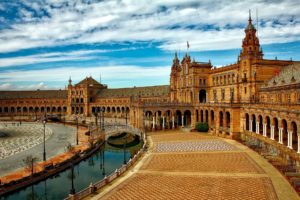
Plaza Espana Seville Spain: Image by David Mark from Pixabay
From distinguished politicians driving social change to recognized STEM field innovators, Hispanics continue to make monumental contributions to the United States, as well as worldwide. With over 60 million U.S. American citizens of Latino or Hispanic heritage comprising 18 percent of the U.S. population, our country flourishes with rich cultural diversity.
From September 15 through October 15, indulge in Hispanic heritage by appreciating the impact Hispanics and Latinos have made on our U.S. nation with a month-long celebration.
1. Origins of the National Holiday: To acknowledge nationwide contributions from the Hispanic and Latino cultures, Congress initiated Hispanic Heritage Week in September 1968. However, it was expanded to thirty days in 1988. One of the main reasons for the updated 4-week long celebration and why it begins in the middle rather than the start of September is because it coincides with various Latin American countries’ independence days. According to the Census Bureau, Costa Rica, El Salvador, Honduras, Nicaragua, and Guatemala celebrate on September 15. Mexico’s Independence Day is September 16, Chile on September 18, and Belize on September 21. What better way to commemorate the achievements of several Spanish-speaking countries while they celebrate their independence from Spain?
2. Understand the Difference Between Latino and Hispanic: While many use the terms “Hispanic” and “Latino” interchangeably, there are striking differences between the two words. According to Harvard University, Hispanic implies Spanish ancestry; its literal meaning is “pertaining to ancient Spain.” In contrast, the term Latino encompasses those with indigenous and/or African roots. The word Latino is a construct of the U.S. Census Bureau when immigrants from Latin America and the Caribbean didn’t identify with the Hispanic response category. Therefore, the options were expanded to include “Not Hispanic or Latino” and “Hispanic or Latino.” When responding there is an opportunity to provide details including:
- Mexican, Mexican American, Chicano
- Puerto Rican
- Cuban
- Another Hispanic, Latino, or Spanish origin
3. Spanish by the Numbers: The United States is home to millions of people from countries across the globe who speak several different native tongues. Spanish, however, is the most popular non-English language spoken in the U.S. with over 52 million Spanish speakers, surpassing the number in Spain! Currently, the world population of Spanish speakers is estimated to be 559 million or 6.7 percent. By 2050, the U.S. is predicted to have the highest Spanish-speaking population globally with 132.8 million people. With the increasing popularity of the Spanish language, native and non-native speakers alike can honor Hispanic Heritage Month by learning one new Spanish word a day.
4. Modern Day Hispanic Role Models & Athletes: Hispanic and Latino role models surround us, making crucial advances in their respective fields. To name a few, our modern-day Hispanic and Latino role models are: Sonia Sotomayor – Supreme Court Justice, twins Joaquin and Julian Castro – American Politicians, Argentine and Italian Diana Taurasi – Olympian who successfully played her fifth Olympics for the USA basketball team and, along with her longtime teammate Sue Bird, became the first basketball player to win five Olympic Gold medals.
Historically, there have also been prominent Hispanic figures that have made a global impact. You can find their stories here.
This year, you may decide to celebrate Hispanic Heritage Month by joining Independence Day celebrations or perfecting your Spanish language proficiency. However, you make an impact, continue to increase your knowledge of the many paramount contributions Hispanics make to the U.S. and remember to enjoy your favorite Latino dish too!
Sharon Schweitzer, J.D., is a diversity and inclusion consultant, cross-cultural trainer, etiquette expert, and the founder of Access to Culture. In addition to her accreditation in intercultural management from the HOFSTEDE Centre, she is an attorney and mediator. Her Amazon #1 Best Selling book in International Business, Access to Asia, won a coveted Kirkus Star, and was named to Kirkus Reviews’ Best Books. She’s a winner of numerous awards, including the British Airways International Trade Award at the Greater Austin Business Awards.
#SharonSchweitzer, #InternationalCelebration, #Cross-CulturalTrainer, #InterculturalCommunication, #InternationalCommunication, #Interculturalist, #Etiquette, #CultureExpert, #Speaker, #KeynoteSpeaker, #GlobalCelebration #History #LatinoHistory #HispanicHistory #LatinoCulture #HispanicCulture

Leave A Comment